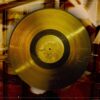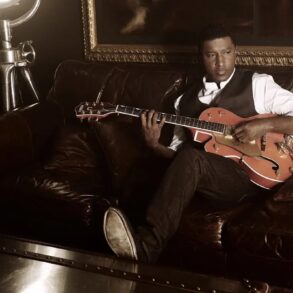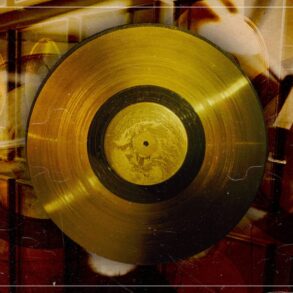Detouring from the release of a series of ambient albums and orchestral reworks of classic tracks, Moby’s 22nd solo album, Always Centered at Night, embraces, not his past music, but an era when the iconic songwriter would spend time in nightclubs, bars and record stores soaking up the eclectic dance sounds of the late 1970s and early 1980s.
The album also features 13 vocal collaborations, some of which were sourced by scouring YouTube, Spotify and even local karaoke bars for the latest talent. Elsewhere, Moby’s defiantly seductive album showcases the vocal wares of acclaimed soul/jazz singer-songwriter Lady Blackbird, Serpentwithfeet, and late dub poet Benjamin Zephaniah.
If someone had told you in 1992 that you’d be about to release your 22nd studio album, would you have believed them?
“For most of my life, up until a certain point, I assumed I was going to make music in my spare time that no one ever listened to. I never expected to have a record deal or play concerts or shows to more than 20 or 30 people and certainly never expected to have anything resembling commercial awareness or success.
“So my long-winded, rambling answer to your question is, no, absolutely not. In 1992, the rave scene was in full swing and I was DJing and touring and making records, but I assumed that by the mid-to-end ’90s my career would have ended and I’d have had to go back to pursuing a PhD so I could teach philosophy at community college.”
Looking back at the mania that surrounded the success of Play – the best-selling electronica album of all time – and the after-effects of that moment in time, are you relieved that you no longer have to make music in such a pressurised environment?
Some producers, especially now, are very good at accommodating the commercial market place, but whenever I’ve tried to do that the end result has been mediocre
“The interesting thing is that the music on Play was made in a completely unpressurised environment because I never expected anyone to listen to it. In 1997/98 when I was finishing the music for Play, I’d been dropped by my American record label, and Daniel Miller of Mute Records hadn’t dropped me but it felt like that was because he felt sorry for me. Play was made in my bedroom on cheap equipment and the commercial expectations were so low as to be non-existent, so it was a very unpressurised environment.
“It was the next few records where I put a lot of pressure on myself to try and make music that would be creatively interesting and commercial successfully, but I realised pretty quickly that I’m not good at that. Some producers, especially now, are very good at accommodating the commercial market place, but whenever I’ve tried to do that the end result has been mediocre.”
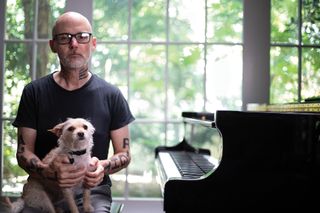
You’re as prolific now as you were at the beginning of your career, if not more so. This is quite rare in the music industry – do you think artists today take too long to make music?
“My question is a really simple one: what else are they doing? I only release about 2% of what I make, which doesn’t speak to the quality of my music, but 98% of it is collecting digital dust and has never been released, so one of my sources of frustration is that I can’t release more music. When I hear about musicians taking a long time to make a record, my immediate thought is, ‘gosh, they must have such phenomenal social lives or lots of other hobbies’.
“I don’t date or socialise that much, I just spend all my time staying home and either working on my weird little TV/film activist production company, Little Walnut, or working on music.”
Musicians often blame their lack of productivity on paralysis of choice. Do you circumvent that by enforcing limitations on yourself?
“I don’t have too many friends involved in the world of music, so in a way I almost feel that you’d be far more of an expert in answering that because you talk to way more musicians than I do. A part of me would want to be a little glib and dismissive of the idea of paralysis of choice, but at the same time it seems like it actually does inhibit people from making things. I work in Pro Tools because I’m old, but when I open it and start playing around with soft synths and all these different things, I just get excited.
“When you hear all of the different sounds that you can potentially use and [modify], I don’t ever feel overwhelmed or paralysed, I feel inspired that I have such an amazing palette of things to play with. If anything, sometimes there’s a wistful sadness that I won’t be able to hear all of the thousands of sounds from all of the soft synths I have and often wonder what I’m missing when I open up the Arturia CZ-101 or CS80V.”
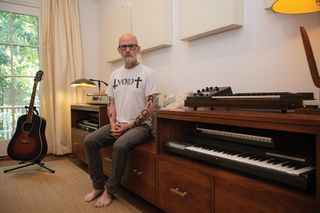



In what way is Always Centered at Night inspired by the music and record labels that have influenced you over the years?
“I’m a little hesitant to say this because I don’t wanna sound like another old guy indulging in nostalgia, but it’s very much inspired by the ethos and character of the electronic music world in the late ’70s and early ’80s. That doesn’t mean it sounds like that – although some of the tracks do, it’s more about the experience I had during that period when I was wandering around Lower Manhattan going to nightclubs, bars and record stores and being exposed to such a phenomenal diversity of, not just music, but music tradition.
“It was all dance and electronic music back then, but there was almost no uniformity. A DJ like David Mancuso was playing Kraftwerk followed by Grace Jones, or Manu Dibango and then New Order. It was so eclectic and every song you heard came from a weird different tradition or combination of traditions. The band ESG was a perfect example of that – three Puerto Rican sisters in the South Bronx making a record with Martin Hannett who produced Joy Division.
You got exposed to everything, including interesting criminal activity because we sold a lot of bootlegs
“When you listened to a lot of the music back then, you weren’t just responding to it, but also the semiotic signifiers or anthropological cultural touchstones within the music, wondering where it came from, who made it and how they made it. That milieu was really fascinating and the inspiration for this record, even though I fully understand how someone could listen to Always Centered At Night and have no idea whether anything I’ve said makes sense. The album doesn’t necessarily sound nostalgic, but it’s certainly been inspired by that eclectic approach to electronic music and dance music.”
Is part of that experience of reminiscing based on a period in the ’80s when you worked at a record store?
“It’s very much part and parcel of that. I worked in a record store from 1984 for a few years, and like a lot of records stores back, then it was so strange and eclectic. You got exposed to everything, including interesting criminal activity because we sold a lot of bootlegs.
“One of my jobs that wasn’t altogether legal involved my boss giving me some brown paper wrapped around $10,000, and I’d have to go to a parking lot after dark and give it to bootleggers. It wasn’t like buying crystal meth from gang bangers, everyone was really nice – I was just buying Grateful Dead bootlegs from old hippies who had to be paid in cash.”
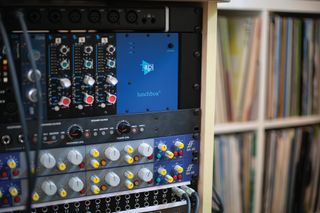



Obviously, everything’s completely changed since then and there are not many local record shops around. Have you embraced that technological shift or resisted it?
“How about both? Music culture has always been fascinating to me, whether it’s a record store or some kid releasing a track on SoundCloud. There’s something about the current state of DSPs like SoundCloud and YouTube that’s so egalitarian, so on the one hand I miss how the only way you could find music before the internet was to find record stores, dig through crates and buy lots of garbage to find one phenomenal record, but I also love the fact that, today, a producer in South Korea who doesn’t speak English can post a track on SoundCloud and two seconds later reach an audience in New Zealand or San Francisco. The democratic aspect of that is really special, so I can’t necessarily complain about how things might have been supplanted.”
The way that I approach making music seems so simple, rational and normal, but then I take a step back and realise that almost no one else makes music this way
The latter half of your career has increasingly focused on vocal collaborations. Is that an attempt to break away from the isolation of working as a solo artist?
“The way that I approach making music seems so simple, rational and normal, but then I take a step back and realise that almost no one else makes music this way. That doesn’t mean it’s good or I’m better at it, but the fact I’ll bend over backwards to work with so many singers and different genres or styles is to me the most interesting way to approach making music and I don’t understand why everyone else isn’t doing that.
“The first three or four Massive Attack records made so much sense to me – they experimented with genres, worked with different singers and tried to write beautiful songs with them. To me, that should be the dominant paradigm rather than producers, DJs or bands working within one genre for decades and only having one singer. That only makes sense if you’re David Bowie, otherwise I don’t understand why you would limit the creative process. Again, it’s not that the labour of my fruits is any better, but experimenting with genres and different collaborators just seems to be the most interesting way of approaching things.”
In searching for vocal contributors we read that you felt like the Terminator seeking out vocalists in karaoke bars around Lower Manhattan. Being Moby, was that an easy thing to do?
“Going out into the world looking for vocalists is both very difficult and very easy. What makes it easy is my love for the process and how remarkable it is when you find a great vocalist. What makes it tiring is the emotional ennui of knowing that I’m only ever going to hear 0.00001% of the vocalists that are out there. Whether I’m scrolling through SoundCloud, YouTube and Spotify or going to karaoke bars finding singers, the effort never gets tiring.”
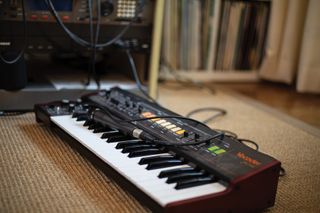



It must be motivating to provide an unknown singer with an opportunity to perform on a Moby album. Do you have any nice stories related to that search?
“I’ve worked with so many hundreds of people and some I’ve worked with seem completely unbothered by any aspect of us working together. They come in or send their parts and I never hear from them again or know if they like what I did, and so the only thing that matters in that case is whether the end result was interesting and creatively satisfying.
“I respect some musicians just wanting to do a vocal part without any follow up, but going way, way back, one of the first singles I put out was a song called Move. The vocalist I worked with on it was a gospel singer and we were in the UK, going to Top of The Pops, and she just started crying and said, ‘I never expected this, I’m just a gospel singer who sings in church and I never thought I’d fly across the ocean to play on the most iconic music TV show of all time’.
We’re not appealing to the lowest common denominator, we’re trying to make something unique and potentially beautiful and special
“We self-evidently live in a world where people try to keep their vulnerabilities and emotions to themselves, so those moments when I realise I’ve been able to give someone a significant or profound experience is very emotionally satisfying.”
Your albums typically have a concept behind them. From that perspective, did you give your collaborators lyrical guidance or prefer them to provide their own interpretation of your music?
“I like to give them a tabula rasa, so I’ll send a piece of music and see how they’re going to respond to it. The one and only piece of guidance that I ever give vocalists is to remind them that they don’t have to write pops songs. Pop music has come to dominate everything to such an extent that so many lyricists, vocalists and musicians feel like they’ve been pressured to only try and write pop music, so one of the biggest challenges is going back to people and saying, look, be as creative as you want and use this as an opportunity to be poetic, idiosyncratic and write personal lyrics that might only make sense to you.
“We’re not appealing to the lowest common denominator, we’re trying to make something unique and potentially beautiful and special, but a lot of musicians feel like they need to take those inclinations and slaughter them on the altar of pop music.”
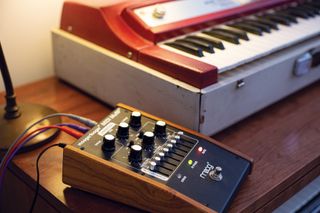



In retrospect, we’re guessing Where Is Your Pride? with the late Benjamin Zephaniah is a particularly poignant track for you?
“First and foremost, I approached Benjamin as a fan of his veganism and the follow up was asking whether he wanted to work on music together. The track was finished last autumn just as his health very sadly started deteriorating, and so I want the song and the video that we’re trying to finish to be a very creative and respectful homage to him and his work and to remind people that he was a beautiful and intelligent person. He was definitely not a household name, but there are so few people in the world who have that level of integrity, so drawing attention to him and his work is the main goal of that particular song.”
Ache For with Jose James is, perhaps, a very distinctive example of you writing for a very specific style. Did writing a jazz track come naturally to you?
“The only other song I ever did in a similar vein was Last Night, which is the last track on that record so very few people ever heard it. It’s a torch song and I love music that has those quiet jazz brushes with simple plaintive piano and vocals. I love jazz when it’s not complicated, and my problem with it is that a lot of musicians feel like they need to be complicated. For me it’s about writing a pretty song, you don’t need to have a nine-minute jazz fusion guitar solo in the middle of it.”
With this type of project, rather than having to complete a song from start to finish, would a demo need to be incomplete, knowing that a vocalist would be adding their input?
“When I send the instrumental through to potential collaborators you can’t send something that’s too busy, you need to provide a lot of space for them. In the best case scenario, when they send back the vocal recording I realise that it’s so special or wonderful that I don’t need to clutter it up with other elements or add anything else. For example, originally, there were some break beats and bassline elements underneath the Jose James track, but I pulled it back as much as possible so the vocal could stand out even more.”
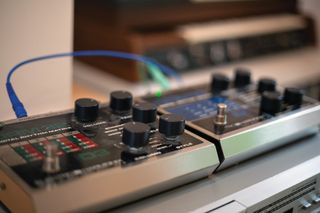



Can you tell us a little about the demo writing process and where that starts for you?
“I’m sorry if this isn’t very anecdotal or even interesting, but I’ve always found that small, almost monastic and simple one-person studios are my favourite place to work, and there’s almost never any thought beforehand other than deciding what the instrumentation might be. Whether I’m starting out with guitar or bass, a drum machine or an old analogue synth, I might need 30 seconds of prep to tune them, but then it’s just about playing around and seeing what happens. It’s a really satisfying, almost automatic process – and maybe I shouldn’t admit this, but there’s not a lot of thought involved.”
Examining your fairly limited setup, when did you acquire the Korg M500 Micro Preset synth and what do you like about it?
“That’s actually the first synth I ever bought, 40 years ago. I went to a second-hand store in Connecticut and it was on sale for $20, but throughout the ’80s and into the ’90s I avoided it because it didn’t have polyphony or MIDI. Then I saw some interview with OMD who were talking about how much they loved it, so I thought, ‘Oh, maybe I should go back and use it’, and realised that it has a really poignant quality. Now I use it constantly, but it’s funny that the synth I use the most is the first analogue synth I ever bought.”
Likewise, what’s special about the Electro-Harmonix DRM 32 drum machine?
“About six years ago, I sold a lot of my equipment and gave my money to the Physicians Committee for Responsible Medicine. My criteria for doing that was that if I don’t use a piece of gear enough I should sell it and give the money to charity, but I kept all of my Electro-Harmonix drum machines because they’re so rare and special within the drum machine world. As you know, all of those early machines had goofy, built-in drum programmes, but whoever programmed them initially was a funk drummer, and they’re so usable.”
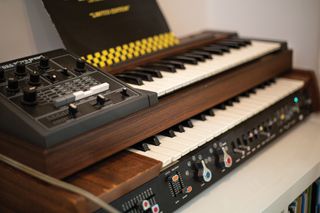



Is using this fairly rudimentary gear more about getting ideas out quickly and then supplanting those sounds with something more sophisticated?
“In those cases, I wouldn’t replace them because they’re so unique and special. You can try and build loops with the drum machines, quantise the swing or augment them with plugins, but I’ve yet to find a plugin that does what they do. What makes analogue equipment special is its musicality and, at times, specific range.
“You’d never use the Korg Micro Preset to create big, lush, low-end pads because it’s monophonic and a little thin, but if you can augment it with some soft synth pads then I think they play very well together. Adding live recorded piano also works incredibly well, because the sound is very reverberant.”
Are there any other key technologies that are critical to your creative process?
“One of my favourite things that I always go back to is the old tape loop machines. I have a few different models, but I use the Echoplex constantly. The case it’s in is rotting and barely holds together, but the electronics work phenomenally well. I never replaced the original tape, so it’s got to be at least 50 years old, but it’s so wonderful because it’s unpredictable, you can’t control it and anything you run through it instantly degrades and has a broken quality.”
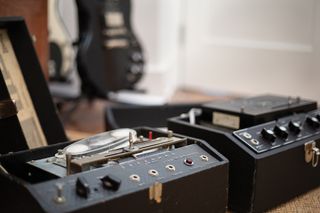



On a separate, but topical, subject, what’s your take on how AI will affect the music industry in the coming years?
“A friend of mine is a chief scientist at an AI company, and I sat him down and said, ‘Everybody’s talking about it and I know what AI does sometimes but don’t know what it is’. He explained it to me and I still don’t know what it is, so I’m throwing myself under the bus here. I know that it can do stuff like create multi-tracks from stereo recordings, which sounds like magic, but I also know it has the potential to be a very corrosive part of our culture.
“40 years ago, Bill Gates said there’s no reason any human would need a computer with 640MB of storage, so the only defining aspect of technology is that it’s not static. The form of AI today will be quaint and unrecognisable two years from now, so I need someone to explain to me, not only what it is, but why we should celebrate or be afraid of it.”
In September you’ll be playing your first live dates in over a decade. As it’s a greatest hits tour, do you see it as an opportunity to rework some of your classic tracks?
“The tour that’s coming up will consist of six or seven shows in Europe, but the only reason I agreed to do it was because my profits are going to animal rights organisations. The secondary goal is to hopefully respect and acknowledge the people who are willing to come to the concerts. I’m sure you’ve had this experience where you go to see a musician and their performance is kind of selfish. For whatever reason, they don’t play the music that people want to hear and, especially when ticket prices are expensive, that seems really insulting.
“My job is figuring out how to give the audience the night that they would want to have. In the early days of DJing, if you didn’t play the music people wanted to hear, you got fired, so hopefully I can create something joyful, emotional and celebratory that really respects the people who are willing to spend money on a ticket.”
Moby’s Always Centered at Night is out now on Mute Records.
This post was originally published on this site be sure to check out more of their content



